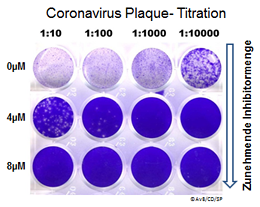Derivatives of a known drug inhibit the replication of a pathogenic coronavirus

Ludwig Maximilian University of Munich researchers have shown that derivatives of a known drug inhibit the replication of a pathogenic coronavirus in cultured human cells. These compounds can now serve as a basis for the development of a novel, broad-range antiviral agent.
LMU researchers have taken an important step forward in their ongoing efforts to find drugs for the treatment of coronavirus infections. In collaboration with colleagues at Halle University and the Max Planck Institute for Biophysical Chemistry in Göttingen, a team led by Privatdozent Dr. Albrecht von Brunn at LMU's Max von Pettenkofer Institute has succeeded in inhibiting the growth of the human coronavirus HCoV-NL63 in cell cultures. The results appear in the latest issue of the journal "Virus Research".
Several types of coronaviruses trigger respiratory diseases of widely varying severity in humans. Coronaviruses evolve rapidly, readily acquire the ability to be transmitted directly from animal hosts to humans, and tend to be highly infectious. The first members of this virus family were discovered in the 1960s, but coronaviruses first made headlines worldwide in 2002 and 2003, when the newly emerged and highly aggressive SARS-CoV caused an epidemic of severe respiratory illness in Asia. Only two years ago, MERS-CoV, the virus responsible for Middle East Respiratory Syndrome, was recognized to be circulating in human populations in Arabia. These infections can result in severe pneumonia causing lethal lung damage, and mortality rates are high.
No antiviral agents have yet been approved for the treatment of coronavirus infections. Albrecht von Brunn and his colleagues are engaged in a search for drugs that are active against a broad range of human and animal viruses, including pathogenic coronaviruses. In 2011, they decided to pursue a novel approach to the inhibition of virus growth by identifying and targeting host factors that are essential for virus replication. Viruses can replicate only within the cells of their hosts, and make use of host proteins to mediate their uptake, facilitate replication of their genomes, and support the assembly of new virus particles. Functional blockade of these host factors should therefore prevent virus replication and propagation. "The unusual feature of this strategy lies in the fact that we block viral infection by disabling the function of a host protein. This promises to have a much more sustained effect than attacking the virus directly, as is usually done. Because we target a cellular function, the virus is far less likely to develop resistance," von Brunn explains.
Tweaking a known drug
HCoV-NL63 was discovered in 2004 and infects the lower respiratory tract. Infection can result in severe bronchitis and pneumonia, particularly in young children. In the new study, the researchers demonstrate that replication of HCoV-NL63 can be potently inhibited in cell cultures by exposure to derivatives of the drug cyclosporin A. This compound has been in use as an immunosuppressant in transplant patients since the late 1970s. However, in the derivatives synthesized by Professor Gunter Fischer and Dr. Miroslaw Malesevic of the Max Planck Institute for Biophysical Chemistry and Halle-Wittenberg University, respectively, the structure of cyclosporin A has been modified so as to inactivate its immunosuppressant function. Another cyclosporin relative, named alisporivir, was also found to be active against HCoV-NL63 in the study. Alisporivir is already in Phase III clinical trials, having been developed for a different application, and was made available to the researchers by Novartis.
"Cyclosporin A itself is known to bind to the enzyme cyclophilin A. Cyclophilins are essential for the functions of many cellular and viral proteins, and play a significant role in a number of disease processes," says von Brunn. This is because cyclophilins are involved in helping other proteins, both viral and cellular, to fold into the specific three-dimensional shapes on which their activities depend. "Binding of cyclosporin A inactivates this function," von Brunn explains. In addition, the complex formed between cyclophilin and cyclosporin A interferes with processes required for adaptive immune responses, and this is what accounts for the immunosuppressive action of cyclosporin A. "But since there is no point in treating respiratory viruses with an immunosuppressive drug, we have inactivated this function," von Brunn adds.
The new study demonstrates for the first time that non-immunosuppressant derivatives of cyclosporin A inhibit the replication of HCoV-NL63 in cultured human cells. But, as von Brunn points out, "cyclosporin A itself inhibits the replication of several different coronaviruses," which suggests that its new derivatives may well be active against other types of coronaviruses too. He and his team are now testing this hypothesis on, among others, coronaviruses isolated from cats and mice. "We are particularly interested in exploring the inhibitory effects on highly infectious coronaviruses such as SARS-CoV und MERS-CoV, because the new agents could enable us, for the first time, to prevent epidemics caused by these strains," he says. Brunn is a member of the SARS Zoonosis Network, which is supported by the Federal Ministry for Education and Research.
More information: Javier Carbajo-Lozoya, Yue Ma-Lauer, Miroslav Malešević, Martin Theuerkorn, Viktoria Kahlert, Erik Prell, Brigitte von Brunn, Doreen Muth, Thomas F. Baumert, Christian Drosten, Gunter Fischer, Albrecht von Brunn, "Human coronavirus NL63 replication is cyclophilin A-dependent and inhibited by non-immunosuppressive cyclosporine A-derivatives including Alisporivir," Virus Research, Volume 184, 12 May 2014, Pages 44-53, ISSN 0168-1702, dx.doi.org/10.1016/j.virusres.2014.02.010.














